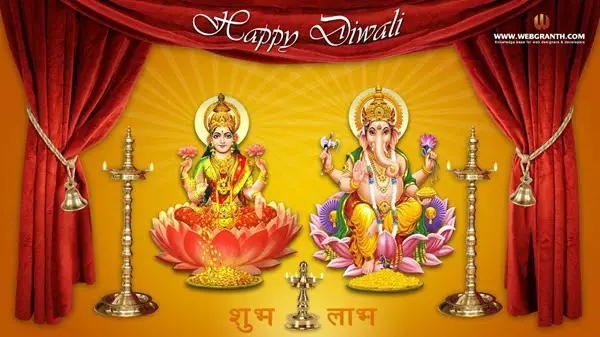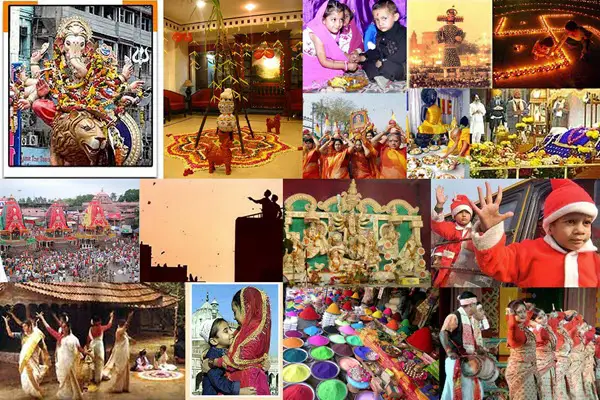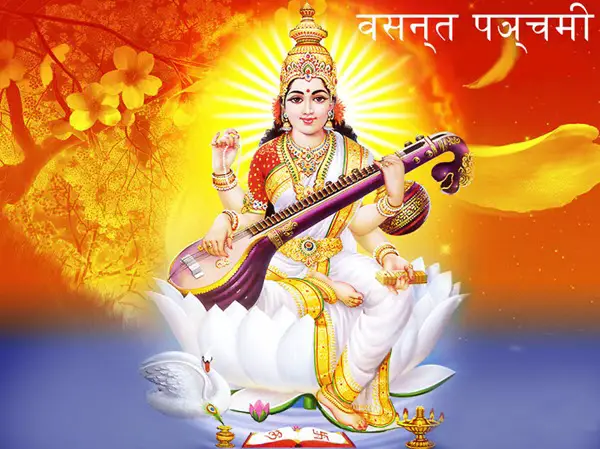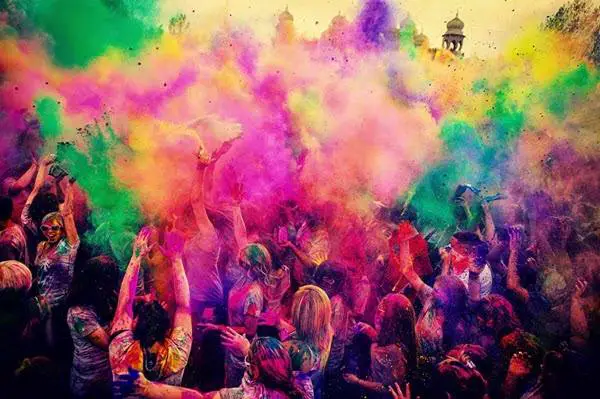Dhanteras, or Dhantrayodashi, is one of the most significant festivals of the Hindus. It is celebrated in most parts of India with tremendous enthusiasm.
It is also known as “Dhan Trayodashi” or “Dhanvantari Trayodashi.” Dhanteras is regarded as the festival of wealth.
Dhanatrayodashi marks the start of the five-day Diwali festival.
“Dhan” means wealth, and “Teras” or Trayodashi means the 13th day of the month.
According to the Hindu calendar, Dhanteras is celebrated on the thirteenth day of the dark fortnight of the month of Karthik Krishna Paksha.
On the day of Dhanteras, the God of Death, Lord Yama, is worshiped. People seek His blessings for peace, long life, and prosperity.
The popular custom is also to worship Lord Kubera, the God of Wealth. People visit jewelry stores and buy Gold or Silver to mark Dhanatrayodashi. They also buy new utensils.
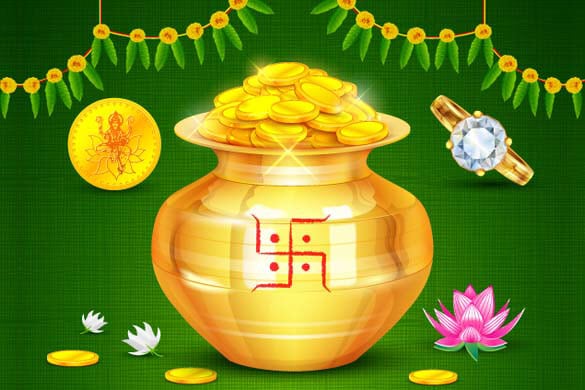
Table of Contents
Dhanteras Date 2025 & Dhanvantari Puja Time
Dhanteras will be celebrated on 18th October 2025, Saturday
- Dhanteras Puja Muhurta: 07:16 PM to 08:20 PM
- Trayodashi Tithi Starts: 12:18 PM on 18th October 2025
- Trayodashi Tithi Ends: at 01:51 PM on 19th October 2025
Dhanteras Legends
Here, you will come to know about the legends that are associated with the festival of Dhanteras.
It is also known as the legend of Dhanatrayodashi.
The “legends of Dhanteras” can be understood as traditional stories that offer a background for celebrating the festival of Dhanteras.
It brings about the importance of the Dhanteras festival.
Further up, these legends have been passed from generation to generation. Some of them have even been mentioned in Hindu religious texts.
Many keep a day-long fast on the day of Dhanteras. The fast is broken only after performing Lakshmi-Kuber Puja in the evening.
So, the Dhanteras story is also known as “Dhanteras Vrata Katha.”
Dhanteras Vrata Katha
The Story of Goddess Lakshmi and the Farmer
This story or legend of Goddess Lakshmi and the Farmer is popularly known as Dhanteras Vrata Katha.
Once, it so happened that Goddess Lakshmi insisted Lord Vishnu accompany her to the Earth.
Lord Vishnu told Goddess Lakshmi that he was ready to accompany her to the Earth. However, Lord Vishnu put a condition that she should agree upon.
Lord Vishnu said that she should not fall for earthly temptations and should not look in the south direction.
Goddess Lakshmi agreed to these conditions put forward by Lord Vishnu.
However, it happened otherwise.
Goddess Lakshmi is known for her “Chanchal” (fickle) nature. She was tempted and looked in the southward direction.
Goddess Lakshmi could not resist her urge and looked in the south direction. She broke her pledge and moved towards the south.
As Goddess Lakshmi moved in the south direction, she was spellbound by the beauty of yellow mustard flowers and sugarcane fields spread everywhere.
Finally, Goddess Lakshmi succumbed to the earthly temptations and started decorating herself with mustard flowers. She also enjoyed sugarcane juice.
However, Lord Vishnu was much annoyed with Goddess Lakshmi as she had broken her pledge.
Lord Vishnu was full of anger and told her to spend the next twelve years on the earth as penance.
She would have to serve in the field of the poor farmer who had cultivated mustard and sugarcane in the area.
The arrival of Goddess Lakshmi meant prosperity for the poor farmer. He became prosperous and wealthy overnight.
Slowly and steadily, twelve years passed, and the time came when Goddess Lakshmi had to return to Vaikuntha.
Lord Vishnu disguised himself as an ordinary man to take Goddess Lakshmi back to the Vaikuntha Loka. However, the farmer refused to relieve Goddess Lakshmi from his services.
Lord Vishnu tried his best to convince the farmer to relieve Goddess Lakshmi, but he was unsuccessful. As a result, the farmer did not relieve Goddess Lakshmi from his services.
Finally, Goddess Lakshmi revealed his true identity to the farmer and told him that she had to leave for the Vaikuntha Loka. She could not stay any longer on the earth.
However, Goddess Lakshmi promised the farmer she would visit him every year on Krishna Trayodashi before Diwali.
As the legend describes, the farmer cleaned his home to welcome Goddess Lakshmi. He lighted his home with earthen lamps made of Ghee. He followed these rituals every year, which made him prosperous year after year.
People came to know about this incident. They also started to worship Goddess Lakshmi on the night of Krishna Trayodashi before Deepawali.
This is how Goddess Lakshmi and Lord Kubera’s worship began on Dhanteras, which came to be known as Dhanatrayodashi.
The Yama Legend
There is also another fascinating legend associated with the celebration of Dhanteras.
The story is about the 16-year-old son of King Hima. He was predicted to die of a snake bite on the fourth day of his marriage. However, his wife was determined to save him from the clutches of death.
So, she did not allow him to sleep on that particular day. She lit lamps everywhere and placed ornaments and lots of Silver and Gold coins at the room entrance. Then, she began to narrate stories and sang songs to keep her husband awake.
When Yama, the God of Death, arrived at the sleeping chamber entrance, he was blinded by the lamps’ light and the jewelry’s brilliance.
He was guised in Serpent’s form and climbed on the top of the gold and silver coins heap. He sat there all night listening to the stories and songs narrated by the wife of King Hima’s son.
Yama was pleased by the young prince’s wife’s attempt to save his husband from death and went away silently without harming her husband. This is how the young prince was saved from the clutches of death.
This day began to be celebrated as Dhanteras, as the brilliance of jewelry and gold and silver coins played a vital role in saving the young prince’s life.
The following day is celebrated to honor the glory of Lord Yama. It is called “Yamadeepdaan” or “Chhoti Diwali.” The ladies light earthen lamps in honor of Lord Yama.
The Dhanvantari Legend
There is another popular legend connected to Dhanatrayodashi.
It is believed that Dhanvantari (considered the Divine Physician and incarnation of Lord Vishnu) appeared on the day of Dhanteras when Devas and demons churned the mighty oceans for the divine nectar or “Amrita.”
The word Dhanteras comes from the name Dhanvantari, the divine doctor of the Devas. Lord Dhanvantari is worshiped on the day of Dhanteras.
Dhanteras Celebrations
Dhanatrayodashi is celebrated with great joy and enthusiasm. Dhanteras marks the start of the five-day-long Diwali festival.
People perform Lakshmi Puja in the evening, and earthen lamps are lit to drive away evil spirits’ shadows. To praise Goddess Lakshmi, people sing devotional songs. They even offer “Naivedya,” consisting of traditional sweets to Goddess Lakshmi.
A peculiar custom is followed in Maharashtra, where people go on to lightly pound dry coriander seeds with Jaggery and offer the preparation as Naivedya.
Homes are thoroughly cleaned and whitewashed.
The main entrance is colorfully decorated with colorful lanterns and holiday lights. Traditional Rangoli designs are made to welcome the Goddess of Wealth and Prosperity.
People light a “Diya” at the base of a Tulsi plant and also in front of their doorways of homes. The light is an offering to the God of Death, Yama, to avert untimely death during the Diwali festival.
In the villages, farmers adorn and worship their cattle as they constitute their income’s primary source.
Small footprints indicating the arrival of Goddess Lakshmi are drawn with rice flour and vermilion powder all over the houses. In addition, people keep “diyas” (lamps) burning throughout the night of Dhanteras to honor Goddess Lakshmi and Dhanvantari.

Dhanteras is considered extremely auspicious for making new purchases. People buy Gold or Silver jewelry and new utensils. Some form of precious metal is believed to be a mark of good luck.
Dhanteras is considered the most auspicious occasion for buying gold or silver articles and even kitchenware. On Dhanteras, people make purchases of appliances and automobiles. Business premises are also decorated.
Dhanteras celebrations are aimed at increasing wealth and prosperity. It is studded with themes of cleaning, renewal, and auspiciousness.
All in all, people want to please Goddess Lakshmi.
Significance of Dhanteras
Dhanteras is starting the Diwali festival. We celebrate Dhanteras on the thirteenth day of the Hindu month of Karthik Krishna Paksha.
On this day, Goddess Lakshmi is worshiped by all Hindus. Lord Kuber is also worshiped on the day of Dhanteras.
The preparations for Diwali start from this day. People start buying clothes, candles, diyas, and crackers.
Dhanteras is especially significant for the business community. New account books are bought on this day and placed before Goddess Lakshmi. People also start new businesses on this day.
If a girl child is born in a household (on the day of Dhanteras), it is considered very auspicious. It is believed that Goddess Lakshmi has arrived in the house.
Hence, Dhanteras is very significant for all Hindus. Moreover, Dhanteras holds great significance as it marks the beginning of Diwali.
According to Hindu religious scriptures, it is believed that Goddess Lakshmi emerged from the Milky Ocean during the Samudra Manthan on the day of Dhanteras.
Dhanteras is also closely related to Lord Dhanvantari. He is considered to be the doctor of the Devas. It is said that Lord Dhanvantari emerged on the day of Dhanteras during the Samudra Manthan.
Dhanteras Puja Vidhi: How to do Dhanteras Puja at Home
As Dhanteras is the festival of wealth, the devotees worship Goddess Lakshmi and Lord Kuber.
The Hindus consider Lord Kuber as the treasurer of the world. People pray for prosperity, success, wealth, as well as the well-being of their loved ones.
According to Hindu scriptures, Goddess Lakshmi had emerged from the ocean and other treasures during the great churning called Samudra Manthan.
Hence Dhanteras has been dedicated to Goddess Lakshmi and Lord Kuber. According to Hindu rituals and beliefs, it is said that people should purchase some new things on the day of Dhanteras.
So, people take to buying gold and silver articles, and even new utensils and kitchenware. It is considered beneficial for the house as it marks the arrival of Goddess Lakshmi in the house.
People decorate their houses to welcome Goddess Lakshmi. They light diyas and make Rangoli at the entrance to their house. Women make tiny footprints, signifying the presence of Goddess Lakshmi.
In the evening, all the family members gather and begin the Puja ceremony in their homes.
The Puja starts with the worshiping of Lord Ganesha.
The idol of Lord Ganesh is given a bath. Then, sandalwood paste is applied to him.
A red cloth is offered, and fresh flowers are showered on the idol of Lord Ganesh.
You can chant the following Ganesh Mantra and take his blessings before starting the rituals of Dhanteras:
वक्रतुण्ड महाकाय सूर्यकोटि समप्रभ ।
निर्विघ्नं कुरु मे देव सर्वकार्येषु सर्वदा ॥
Meaning:
“I bow to the almighty Lord Ganesh, who has a curved trunk, a large body, and studded with the magnificence of a million suns. I pray to Lord Ganesha to always free all my works from obstacles.”
After this, Lord Dhanvantari is worshiped and considered to be the founder of Ayurveda. One can keep an idol or picture of Lord Dhanvantari. You need to bathe the idol of Lord Dhanvantari and apply vermillion to it. You can offer nine varieties of grains to the Lord.
People chant the following Mantra to worship Lord Dhanvantari:
ॐ नमो भगवते महासुदर्शनाय वासुदेवाय धन्वंतराये:
अमृतकलश हस्ताय सर्व भयविनाशाय सर्व रोगनिवारणाय
त्रिलोकपथाय त्रिलोकनाथाय श्री महाविष्णुस्वरूप
श्री धनवंतरी स्वरूप श्री श्री श्री औषधचक्र नारायणाय नमः॥
“Om Namo Bhagavate Maha Sudharshana Vasudevaya Dhanvantaraye; Amrutha Kalasa Hasthaaya Sarva Bhaya Vinasaya Sarva amaya Nivaranaya Thri Lokya Pathaye Thri Lokya Nidhaye Sri Maha Vishnu Swarupa Sri Dhanvantari Swarupa Sri Sri Sri Aoushata Chakra Narayana Swaha”
Worshiping Lord Kuber
You can place an idol or picture of Lord Kuber. One should offer the Lord flowers, fruits, incense, sweets, and diya.
You can then chant the following Kuber Mantra:
ॐ यक्षाय कुबेराय वैश्रवणाय धनधान्याधिपतये
धनधान्यसमृद्धिं मे देहि दापय स्वाहा॥
“Om Yakshyaya Kuberaya Vaishravanaaya Dhanadhanyadi Padayeh
Dhana-Dhanya Samreeddhing Me Dehi Dapaya Swaha”
Meaning:
“Lord Kubera, the lord of yakshas, please bless us with wealth and prosperity.”
Worship of Goddess Lakshmi
Goddess Lakshmi is worshiped in the Pradosh Kaal on Dhanteras. It is the time after sunset and lasts for nearly two hours.
Place a new cloth and a handful of grains in the middle of the cloth. The cloth should be placed on a raised platform. Keep a Kalash half-filled with water (mixed with Gangajal), betel nut, a flower, a coin, and some rice grains. You can also keep mango leaves in the Kalash.
A lotus is drawn with Haldi over the grains and keeps the idol of Goddess Lakshmi over the grains.
You can keep your important business books near the idol of Goddess Lakshmi.
Now, you can chant the following Lakshmi Mantra:
श्रीं ह्रीं श्रीं कमले कमलालये प्रसीद प्रसीद ॐ श्रीं ह्रीं श्रीं महालक्ष्मयै नम:॥
“Om Shreem Hreem Shreem Kamale Kamalalaye Praseed Praseed Om Shreem Hreem Shreem Mahalakshmaye Namaha”
Then, bathe the idol of Goddess Lakshmi with Panchamrit. It is a mixture of Ganga Jal, milk, ghee, curd, and honey.
Apply sandal paste, Attar (perfume), Vermillion, Haldi, gulaal, and abeer.
After this, close your hands and pray to the Goddess for success, wealth, prosperity, and well-being.
According to Hindu customs and beliefs, Dhanatrayodashi Puja should be performed in the Sthir Lagna, overlapping with Pradosh Kaal.
Sthir means fixed, “not movable.” Goddess Lakshmi will stay in your home if Dhanteras Puja is performed during Sthir Lagna. So, it is the best time for Dhanteras Puja.

We wish you Happy and Prosperous Dhanteras.

